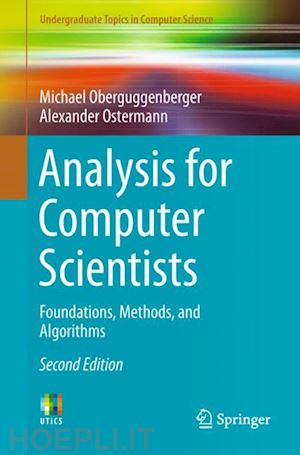
Questo prodotto usufruisce delle SPEDIZIONI GRATIS
selezionando l'opzione Corriere Veloce in fase di ordine.
Pagabile anche con Carta della cultura giovani e del merito, 18App Bonus Cultura e Carta del Docente
This easy-to-follow textbook/reference presents a concise introduction to mathematical analysis from an algorithmic point of view, with a particular focus on applications of analysis and aspects of mathematical modelling. The text describes the mathematical theory alongside the basic concepts and methods of numerical analysis, enriched by computer experiments using MATLAB, Python, Maple, and Java applets. This fully updated and expanded new edition also features an even greater number of programming exercises.
Topics and features: describes the fundamental concepts in analysis, covering real and complex numbers, trigonometry, sequences and series, functions, derivatives, integrals, and curves; discusses important applications and advanced topics, such as fractals and L-systems, numerical integration, linear regression, and differential equations; presents tools from vector and matrix algebra in the appendices, together with further information on continuity; includes added material on hyperbolic functions, curves and surfaces in space, second-order differential equations, and the pendulum equation (NEW); contains experiments, exercises, definitions, and propositions throughout the text; supplies programming examples in Python, in addition to MATLAB (NEW); provides supplementary resources at an associated website, including Java applets, code source files, and links to interactive online learning material.Addressing the core needs of computer science students and researchers, this clearly written textbook is an essential resource for undergraduate-level courses on numerical analysis, and an ideal self-study tool for professionals seeking to enhance their analysis skills.
Numbers.- Real-Valued Functions.- Trigonometry.- Complex Numbers.- Sequences and Series.- Limits and Continuity of Functions.- The Derivative of a Function.- Applications of the Derivative.- Fractals and L-Systems.- Antiderivatives.- Definite Integrals.- Taylor Series.- Numerical Integration.- Curves.- Scalar-Valued Functions of Two Variables.- Vector-Valued Functions of Two Variables.- Integration of Functions of Two Variables.- Linear Regression.- Differential Equations.- Systems of Differential Equations.- Numerical Solution of Differential Equations.- Appendix A: Vector Algebra.- Appendix B: Matrices.- Appendix C: Further Results on Continuity.- Appendix D: Description of the Supplementary Software.
Dr. Michael Oberguggenberger is a professor in the Unit of Engineering Mathematics at the University of Innsbruck, Austria.
Dr. Alexander Ostermann is a professor in the Department of Mathematics at the University of Innsbruck, Austria.











Il sito utilizza cookie ed altri strumenti di tracciamento che raccolgono informazioni dal dispositivo dell’utente. Oltre ai cookie tecnici ed analitici aggregati, strettamente necessari per il funzionamento di questo sito web, previo consenso dell’utente possono essere installati cookie di profilazione e marketing e cookie dei social media. Cliccando su “Accetto tutti i cookie” saranno attivate tutte le categorie di cookie. Per accettare solo deterninate categorie di cookie, cliccare invece su “Impostazioni cookie”. Chiudendo il banner o continuando a navigare saranno installati solo cookie tecnici. Per maggiori dettagli, consultare la Cookie Policy.